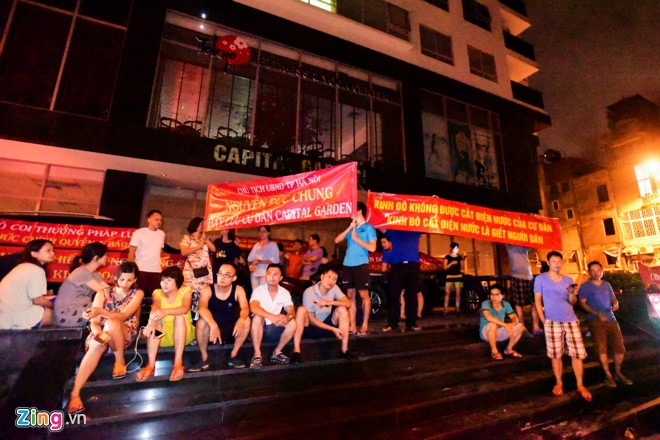 Op-Ed
Op-Ed

Apartment residents should not suffer from troubles as a consequence of investors’ violations
 |
| Capital Garden residents protest the building investor’s violations nd actions. - Photo news.zing.vn |
At noon last Friday, five households of the Capital Garden apartment building on Hà Nội’s Trường Chinh Street had their power and water supply cut.
It was not the public utilities companies that had cut their supply, but the building’s investor, the Kinh Đô Group.
For more than half a year, 60 out of 200 households in the complex had refused to pay service and parking fees to the building management, protesting what they said was inordinately high charges.
“The company has not transferred power grid to Đống Đa Electricity Company. Power and water prices are determined by Kinh Đô. Residents have to pay without getting bills from the investor,” a resident named Trung told news.zing.vn. Others complained that without bills, they did not know for how many days they were being billed, or how much power they have actually consumed.
Apart from the inconvenience caused to the apartment residents/owners, there are serious legal questions that arise in this situation.
Even if residents do not pay their utility bills, does a building management firm or investor have the right to cut off water and electricity supplies? Were the residents given sufficient notice before this action was taken? Is it legal in Việt Nam for private firms to buy and sell electricity for a profit?
The answer to these questions can have significant impacts investor-buyer relations in the real estate sector.
Apartment resident Trung also said that the investor had pledged that residents can move in by the end of 2015, but this did not happen until late 2016.
“I had to wear a protection hat when stepping into the apartment to receive the house. When I started moving in, basic things like the reception counter, community hall, elevators and fire-fighting system were incomplete.” Trung said.
The investor also changed the building design on their own to extend space to build more apartments, aiming at huge profits of hundreds of billions of đồng.
Other provisions of the contract between the investor and buyers that have been violated include holding direct dialogues with residents. Residents say the investor has refused to meet and talk with residents on numerous occasions.
Twelve hours after the investor’s decision to cut power and water supply at midnight on July 14, residents gathered on the building’s first floor and held banners accusing the investors and calling for justice.
There are clear violations by the investor in the case. It did not complete installation of facilities, including crucial ones like fire-fighting equipment in time, and it delayed handing over the apartments for a year or so. To top it all, it took another illegal step in cutting of water and electricity supply, as it has the right to punish protesting buyers.
Last May, residents of the Capital Garden complex had to extinguish a fire by using water from their homes because the fire-safety system did not have any water.
Four months ago, residents of the Hồ Gươm Plaza high rise hung banners for ten consecutive days to protest the delay by the investor (Hồ Gươm Textile Joint Stock Company) in handing over apartment’s maintenance management, hiking parking fees and constructing tanks to collect in the underground parking space.
Ineffective intervention
Authorities have intervened in several investor-resident disputes, but this has had limited impact.
Several development projects have been suspended for not following safety regulations and ordered to complete installation of lacking facilities. But in many cases, investors have delayed compliance with impunity.
The investor of the BMM apartment building in Xa La area, Hà Đông District, Hà Nội had its operations suspended and a penalty of VNĐ80million ($3,480) imposed for not completing fire safety prevention system. However, the investor allowed residents to move in and live in unsafe conditions.
The punishment for violations in installing the fire fighting system, according to Decree 167/2013/NĐ-CP, ranges from VNĐ50 million ($2,173) to 80 million, but many investors prefer to pay this than spend dozens of billions of dong on the installation.
In such a situation, it is apparent that administrative punishments are not prompting the needed corrective action. At a recent meeting between the Hà Nội Party Committee and the municipal Department of Fire Prevention and Fighting Police, Party Committee Secretary Hoàng Trung Hải called for strong measures to force investors reluctant to abide by the regulations.
Authorised agencies have to install the needed equipment to ensure locals’ safety, and have investors foot the bill, Hải said.
Trying to force a bolted horse back into the stable requires a lot of effort. The wiser option is to prevent it from bolting.
Systemic corrections are needed to ensure that building investors do not violate or exploit loopholes to impose exorbitant maintenance charges, parking fees and the like.
While it is incumbent on residents to read the fine print and act prudently in purchasing and moving into an apartment, the system most nip potential investor violations in the bud.
The long-term safety of residents is non-negotiable and should obviously take priority over increasing profit margins, but several disputes that have broken out over the last few years show that expecting investors to act on their own in this regard is naive. - VNS




